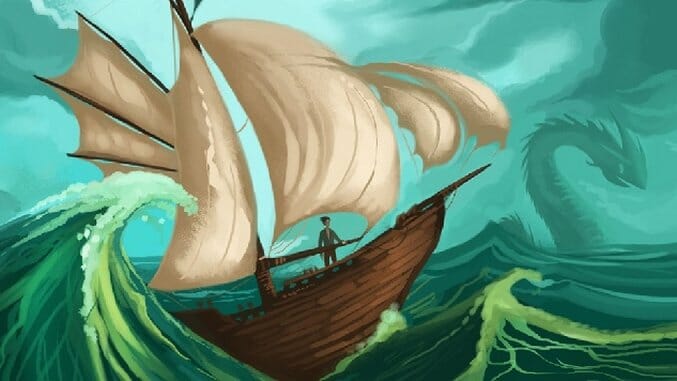
Islebound is a gorgeous game from Ryan Laukat, also the designer of Above and Below, set in an archipelago where the players play the role of pirates who can choose to explore or plunder, hiring crew members, gathering resources, and adding buildings to their capital city to gain additional powers. It’s a great theme and an outstanding design, but the gameplay itself is rote and dry, with no interaction between players and a sense that you’re going through the motions along with everybody else.
There’s no shortage of pirate-themed boardgames on the market—I blame Sid Meier, whose PC game Pirates! was reborn as an app a few years ago and which implemented its theme as well as any game in any medium I’ve played. Islebound may simply try to do too much of everything, as players sail around a fairly small, variable map of a dozen islands, each of which requires some sort of payment for each visit and then confers a specific benefit in resources or crew members. Players can establish diplomatic relations with an island, or can attack it by deploying cards representing pirates or sea serpents; if either attempt is successful, then future visits by other players provide income to the player in control.
Islebound players collect different resources to enable them to do more things on the board, whether it’s visiting further islands, gaining renown points, or buying the buildings that give the player more powers and are worth additional points at game’s end. The collection of these resources can take several turns, however, and players can often go several rounds without being able to do anything but grab stuff—especially because it’s possible to run out of money completely, forcing a player to lose a turn to “hunt for treasure” and take the small pile of money from the central board just to be able to do anything else.
The Islebound concept might work better if the game were quicker, or if players had a better way to create recurring income, which is something of a standard mechanic in games that require and reward building stuff to gain points. The only recurring income in Islebound is unpredictable, as it comes from taking control of islands and waiting for opponents to visit them—but this creates a strong disincentive for other players to visit your islands because their entry fees come to you rather than going to the ‘bank,’ so until later in the game when most islands are claimed in some fashion, players should go to neutral destinations instead of paying you. And by the last stages of the game, opponents will be better positioned to take control of your islands via diplomacy or military strength, and there’s nothing you can do to defend an island you’ve already claimed.
Islebound lists a game time of 90 minutes, which I’d call a little conservative for games of 3 or 4 players, simply because of the number of turns it’ll take to get to the victory condition of any one player constructing seven (for four players) or eight (for two or three players) building cards. It’s recommended for ages thirteen and up, but my ten-year-old had no trouble understanding the game’s mechanics; if anything, the obscure iconography used in Islebound was the biggest obstacle for her in playing at adult speed. The crew member cards also serve as an expansion for Laukat’s game Above and Below; their reverse sides turn them into additional villagers for use in replenishing the latter game’s supply of villagers available for purchase. As attractive as Islebound is in art and theme, it just could not hold my attention as a game, and we were all ready for it to end before we were close to the victory condition.
Keith Law is a senior baseball writer for ESPN.com and an analyst on ESPN’s Baseball Tonight. You can read his baseball content at search.espn.go.com/keith-law and his personal blog the dish, covering games, literature, and more, at meadowparty.com/blog.
